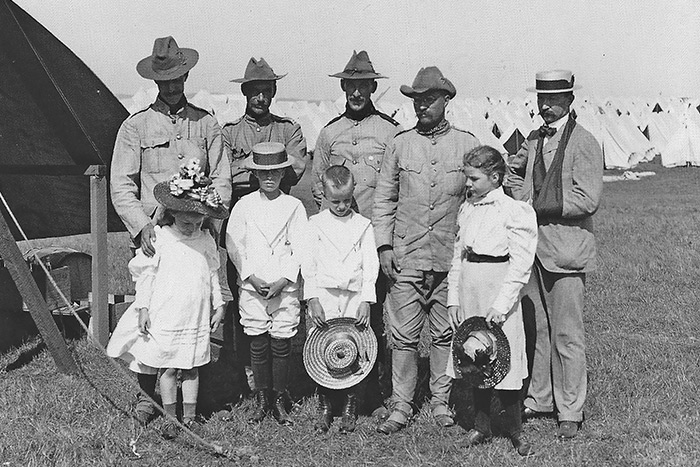Rough Riders at Play in Montauk: 'The Sun' Recounts Roosevelt's Visit

Ater the Spanish-American War ended with the American victory in Cuba, the entire U.S. Army of more than 20,000 men was transported to Montauk for six weeks of rest, recuperation and maneuvers. Teddy Roosevelt, a former state legislator and New York City Police Commissioner, was 39 at this point in his life, and he was a national hero for having led the charge of his Rough Riders up San Juan Hill at the climactic moment of the battle to win the day.
His Rough Rider cavalry unit was here with him. He’d helped form the unit, 1,000 men strong, by recruiting some of the students he knew at Harvard and some of the cowboys he knew during the two or three month annual visits he took herding cattle in the Dakota Country in the years that followed.
No park, plaza or ranch is named for Roosevelt in Montauk. There was a Theodore Roosevelt County Park out by the lighthouse for a few years—the main ranch on the property known as Third House was Army headquarters, but the bureaucrats at the County legislature renamed it Montauk County Park in 2014. We want Teddy’s park back. An article I wrote urging that was in this newspaper a month ago.
Teddy Roosevelt’s time in Montauk has been documented in a recently published book called Bully!, written by Jeff Heatley. It consists largely of daily reports between August 8 and September 12, 1898, written by one or another of the reporters from the New York City newspapers in Montauk to observe the Army here. There’s this wonderful account, published in The Sun, a New York newspaper, on August 28, 1898.

ROUGH RIDERS AT PLAY
There was a thunder of hoofs along the level behind Newspaper Row like the sound of a stampede. Everybody ran out and beheld Colonel Theodore Roosevelt on his big horse tearing across the plain at top speed with a squad of the Rough Riders in hot pursuit some five yards behind. He did not look like the quiet and scholarly gentleman who used to sit in the President’s office at Police Headquarters and bare his teeth at aspiring politicians; though it may be said right here that the Colonel must have hung on to his toothbrush all through the campaign, for he has the same dental gleam as of yore. He was leaning forward in his saddle, his eyes shining, his hat jammed far down on his head, his stocky, supple body giving easily to every motion of the powerful animal he rode. He ploughed through a marsh, lifted his mount over a gully in a flying leap, sped over the weedy stretch beyond, plunged down five feet to the sand beach, and pulled up close to the water’s edge with his men still behind him. Three minutes later the head of Col. Roosevelt could be seen bobbing just outside the line of breakers, with a few of the more daring swimmers among the men nearby. Presently, a large and somewhat premature wave broke out beyond the line, caught the cavalry leader unawares, and he disappeared from the scene of action in a swirl of seething water, to reappear a second later a rod in spluttering and laughing.
“Phew! That makes a man feel alive,” he said as he trotted out of the water and dried himself.
A few minutes afterward he was again leading his squad in a race across the landscape.
—The Sun, August 28, 1898
Just two years after this splendid gallop across Montauk, Teddy Roosevelt, at 42, would be President of the United States.




